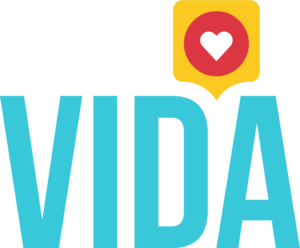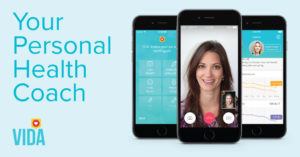Vida Health: Marrying Data with Real Person Guidance

Vida health matches your personal data with an in-person expert to give you personalized health advice and coaching.
Vida Health uses a mixture of data and human interaction to facilitate discussions between health experts and patients [1]. These health experts have backgrounds in health, nutrition, exercise, and motivational psychology, and patients [2].
The app focuses on both general wellness and behavioral health (e.g. stress management) as well as more serious or targeted health issues like managing a chronic disease. Common patient focuses include:
- Weight Loss
- Personal Training
- Nutrition Guidance and Meal Planning
- Prenatal Coaching
- Physical Rehabilitation Exercises
- Diabetes Management
- Autoimmune Conditions
- Chronic Pain Management
- Heart Health
- Blood Pressure Control
- Digestive Disorders
- Stress Management
- Emotional Health Coaching
- Tobacco Cessation
- Menopause Coaching
- Race/ Event Day Training
Vida health has you answer a variety of questions and then allows you to choose who you would like to speak to based on your goals. You then setup a weekly video call with that professional [3]. You can sync data that you’ve already collected on your phone through other apps – it has the integrations setup. This means the app is also collecting even more data on the user from even before they signed up with the app. And as they continue to collect data (and capitalize on the data that other services are acquiring through these integrations!), they get smarter about dealing with patients with similar behavior patterns.
Vida uses data to track your weight, diet, sleep and exercise, and then a professional speaks with you to check in on your goals. On the surface, the data is only being used for accountability. However, the app has the power to use the data in a way that’s helpful to the patients (provided it’s done in a privacy- conscious manner). In aggregate, it is getting access to people’s every day habits that they can then segment by chronic disease. This data can then inform the way they treat people going forward based on what they’ve seen as causing negative or positive behaviors.
Vida differs from its competitors in that it is broader than some of the more medically-focused competitors out there. It also has a live person you chat with, making it different from something like WebMD or other information providing services. That’s what gives it a personal touch. The user becomes attached to the person instead of just finding value by a personalized digital experience. When it comes to health, people are sensitive about the quality of information and the accuracy. Having a human deliver guidance gives it its competitive edge, so while data is important, it’s the marriage of it to the personal touch that really makes this app powerful.
When Vida Health started it didn’t use as much data but focused more on fewer experts. Now that they have a team, they are able to address more issues and highlight more on their website around what they do best (chronic illnesses). This helps people get a better understanding of what they’re all about. Originally their marketing was so broad it wasn’t clear what they actually provided.
More broadly I like this model not just for the health industry but also for a lot of these data-driven companies. I would categorize this as more of a “data-informed” as opposed to data driven company. I think it’s important, especially when you are dealing with sensitive information, topics, or subjects, to make sure to have human oversight and not expect computers or data to solve all problems. Sometimes, even as valuable as data an be at scale, a personal one-on-one human touch can be invaluable from both a personal and a business perspective.
Sources
[1] “Vida Health Coach.” Vida, www.vida.com/faq/.
[2] “Vida Health Coach.” Vida, www.vida.com/who_we_are/.
[3] Shandrow, Kim Lachance. “This Health App Puts Real, Live Medical Professionals In Your Pocket.” Entrepreneur, 26 Jan. 2015, www.entrepreneur.com/article/242189.




